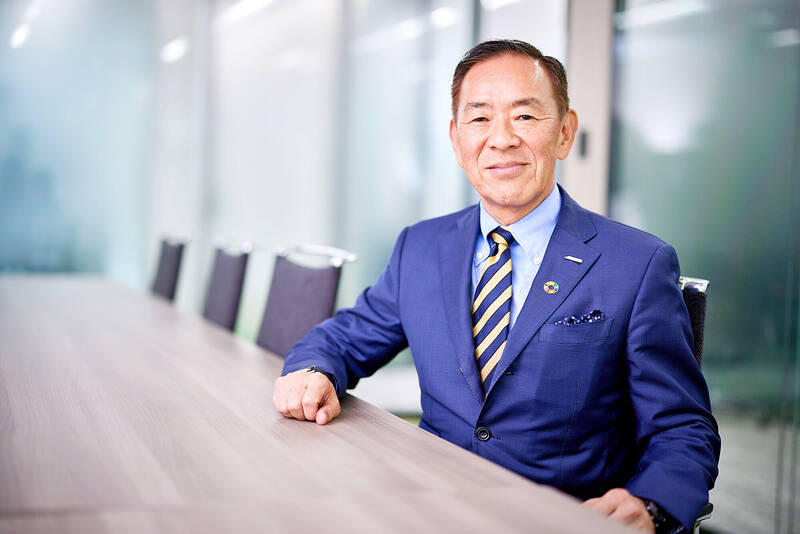Japan’s government-backed Rapidus Corp is lobbying chipmakers, their suppliers and research institutions to set up shop on the island of Hokkaido in a bid to make the remote region a center of semiconductor innovation within a decade.
The 13-month-old start-up’s goal to make cutting-edge chips from scratch is part of a broader design to build a Silicon Valley-like ecosystem. Rapidus envisions a chipmaking cluster spanning coast to coast, with easy access to multiple ports, CEO Atsuyoshi Koike said.
“My big ambition is to realize a ‘Hokkaido Valley’ that spreads from Tomakomai to Ishikari that can compete against Silicon Valley in size,” Koike, 71, a former Western Digital Corp executive, told Bloomberg News.

Photo: Bloomberg
“We have a chance to become a North Star” that sets the trend in the global chip industry, he said.
Rapidus, a company backed with billions of US dollars in taxpayer funds and support from household names such as Sony Group Corp and Toyota Motor Corp, is plotting a course to mass-produce 2-nanometer logic chips by 2027.
If successful, the long-shot endeavor would mean a generational leap in tech for Japan, whose chipmaking capability stalled decades ago at now-legacy 40-nanometer nodes.
Koike is inviting manufacturers throughout the supply chain to invest in Japan’s northernmost prefecture of Hokkaido, where Rapidus is building a factory in preparation for pilot line operations in 2025.
Companies need to work together more effectively toward a common goal, the chip veteran said.
Working separately “is not the right way,” he added.
Instead of competing against global chip giants that make large volumes of all-purpose chips, the Tokyo-based company would focus on pioneering specialized chips, such as low-power-consumption artificial intelligence chips, Koike said.
Hokkaido, which has ample clean water and is one of Japan’s top producers of renewable energy, is an ideal location to stage a chip renaissance, he said.
The venture is central to Japanese Prime Minister Fumio Kishida’s signature project to revive Japan’s status as a chip superpower and jump-start the long-stagnant economy.
The ability to domestically make the most advanced chips is crucial to lowering dependence on sector leaders Taiwan Semiconductor Manufacturing Co (TSMC, 台積電) and Samsung Electronics Co in an era of artificial intelligence and rising US-China tensions, policymakers say.
Japan has allocated US$2.4 billion for the venture, with officials saying they are prepared to provide a comparable budget every year.
Kishida has pledged “utmost support” to Rapidus to keep the venture on track.
However, daunting hurdles remain. A shortage of engineers is constricting chip production around the world. Rapidus employs 200 people, compared with more than 73,000 at TSMC, which is also hiring workers for its new factory in Japan’s southwestern Kumamoto Prefecture.
Still, Koike said that he is confident.
California-based Lam Research Corp and Belgium-based microelectronics research hub IMEC are not the only ones setting up shop in Hokkaido, he said, adding that many Japanese chip material suppliers and equipment makers are also considering production sites close to Rapidus’ upcoming plant.
TSMC’s success in spurring economic growth in Kumamoto Prefecture is generating high hopes about Rapidus’ effect on Hokkaido.
Creating Hokkaido’s version of Silicon Valley would take time, but is feasible, Koike said.
“We’d like to get there by around 2030,” he added.

Intel Corp chief executive officer Lip-Bu Tan (陳立武) is expected to meet with Taiwanese suppliers next month in conjunction with the opening of the Computex Taipei trade show, supply chain sources said on Monday. The visit, the first for Tan to Taiwan since assuming his new post last month, would be aimed at enhancing Intel’s ties with suppliers in Taiwan as he attempts to help turn around the struggling US chipmaker, the sources said. Tan is to hold a banquet to celebrate Intel’s 40-year presence in Taiwan before Computex opens on May 20 and invite dozens of Taiwanese suppliers to exchange views

Application-specific integrated circuit designer Faraday Technology Corp (智原) yesterday said that although revenue this quarter would decline 30 percent from last quarter, it retained its full-year forecast of revenue growth of 100 percent. The company attributed the quarterly drop to a slowdown in customers’ production of chips using Faraday’s advanced packaging technology. The company is still confident about its revenue growth this year, given its strong “design-win” — or the projects it won to help customers design their chips, Faraday president Steve Wang (王國雍) told an online earnings conference. “The design-win this year is better than we expected. We believe we will win

Chizuko Kimura has become the first female sushi chef in the world to win a Michelin star, fulfilling a promise she made to her dying husband to continue his legacy. The 54-year-old Japanese chef regained the Michelin star her late husband, Shunei Kimura, won three years ago for their Sushi Shunei restaurant in Paris. For Shunei Kimura, the star was a dream come true. However, the joy was short-lived. He died from cancer just three months later in June 2022. He was 65. The following year, the restaurant in the heart of Montmartre lost its star rating. Chizuko Kimura insisted that the new star is still down

While China’s leaders use their economic and political might to fight US President Donald Trump’s trade war “to the end,” its army of social media soldiers are embarking on a more humorous campaign online. Trump’s tariff blitz has seen Washington and Beijing impose eye-watering duties on imports from the other, fanning a standoff between the economic superpowers that has sparked global recession fears and sent markets into a tailspin. Trump says his policy is a response to years of being “ripped off” by other countries and aims to bring manufacturing to the US, forcing companies to employ US workers. However, China’s online warriors